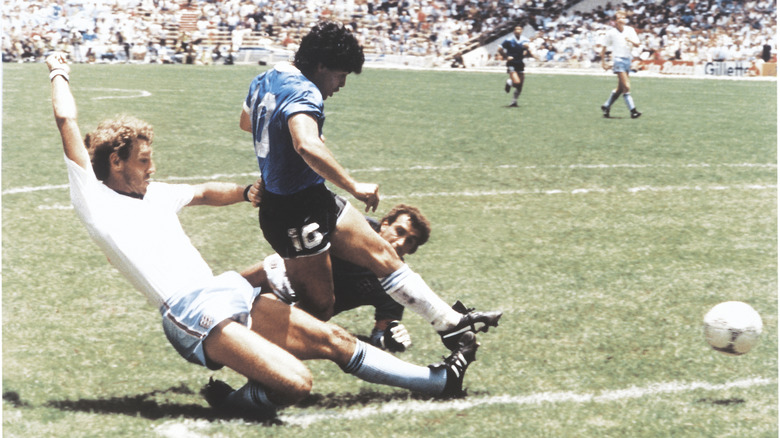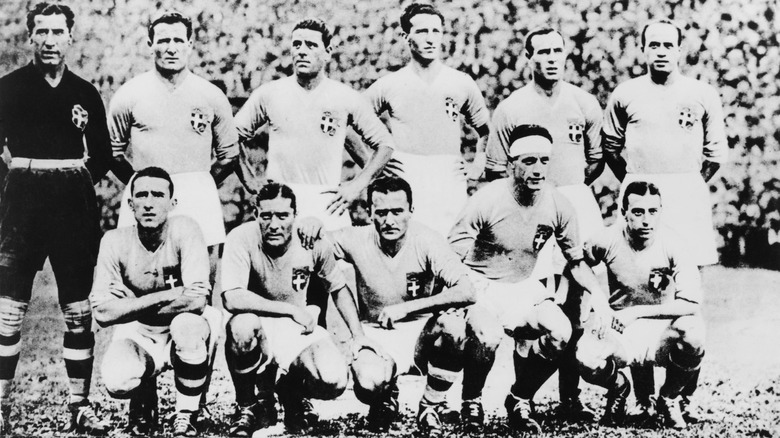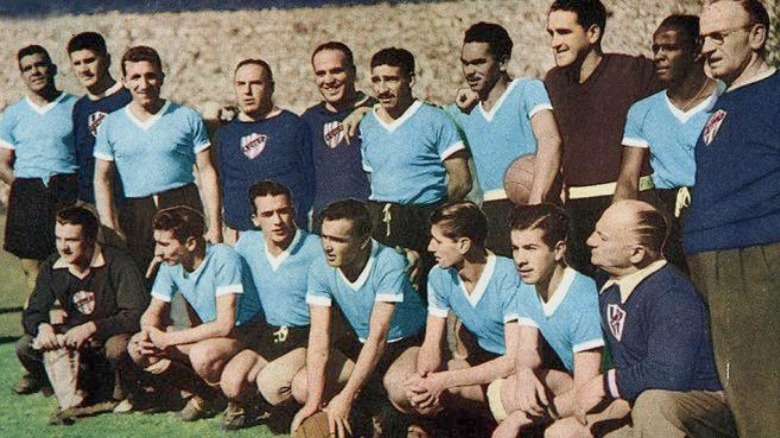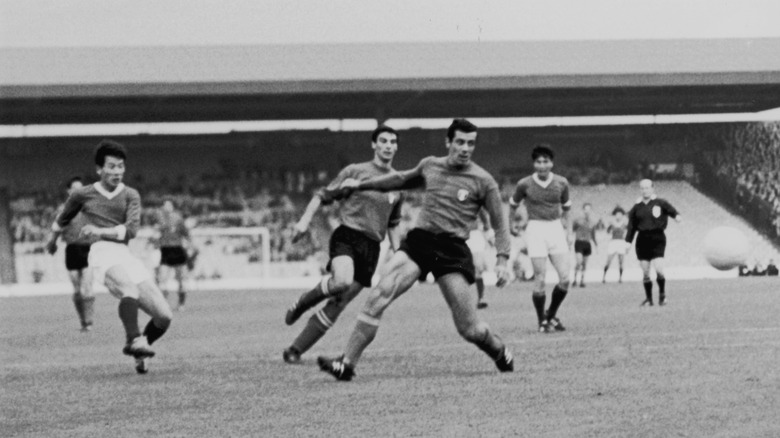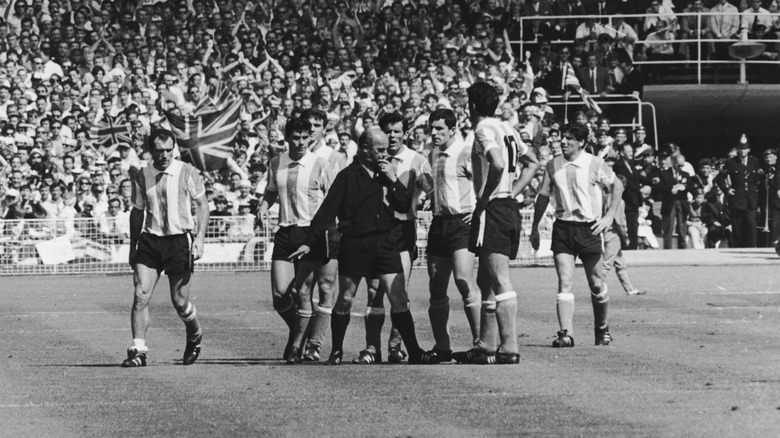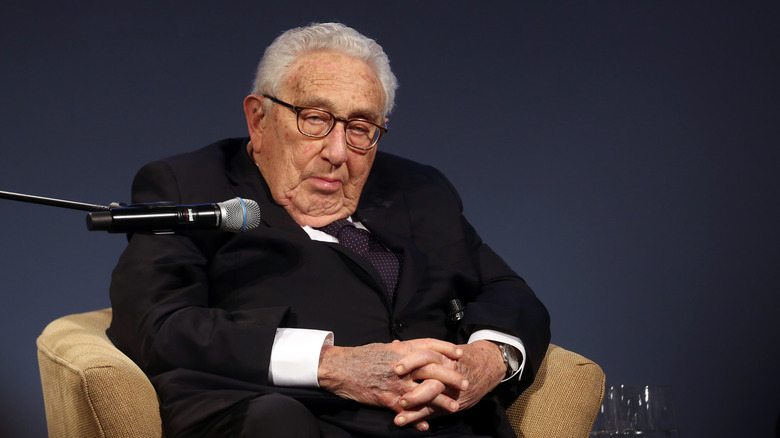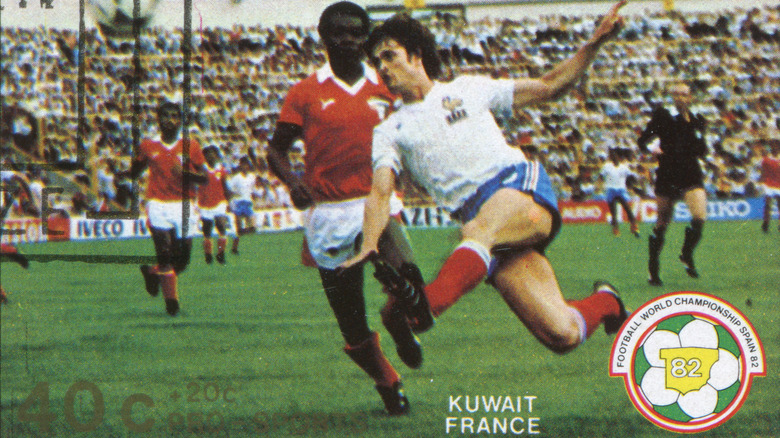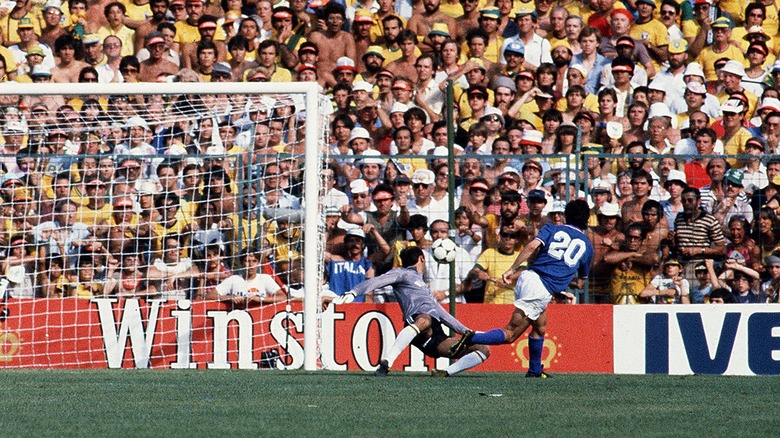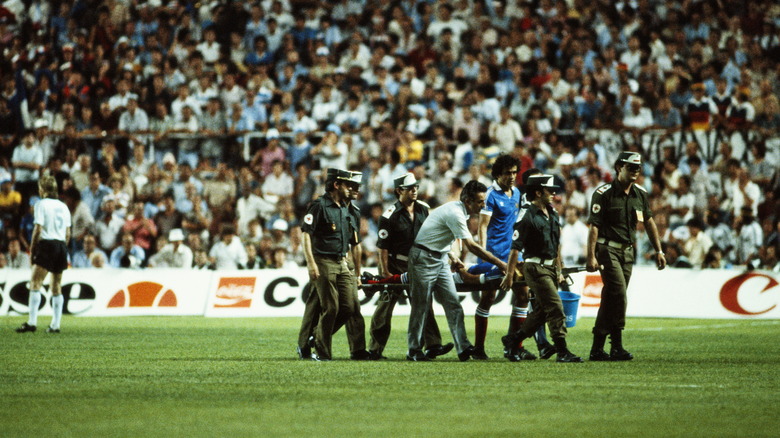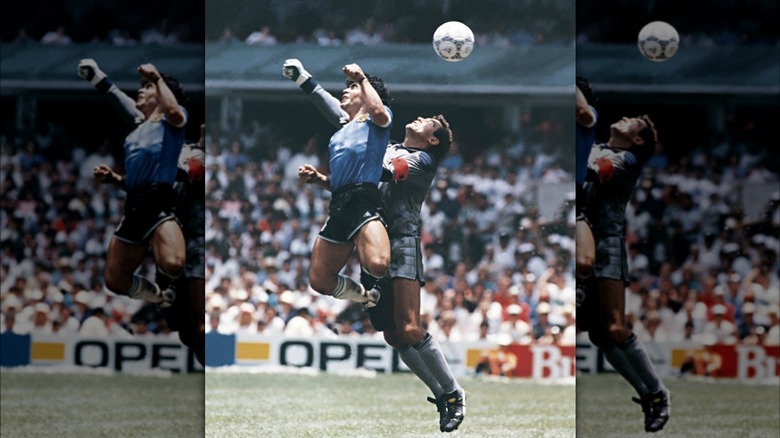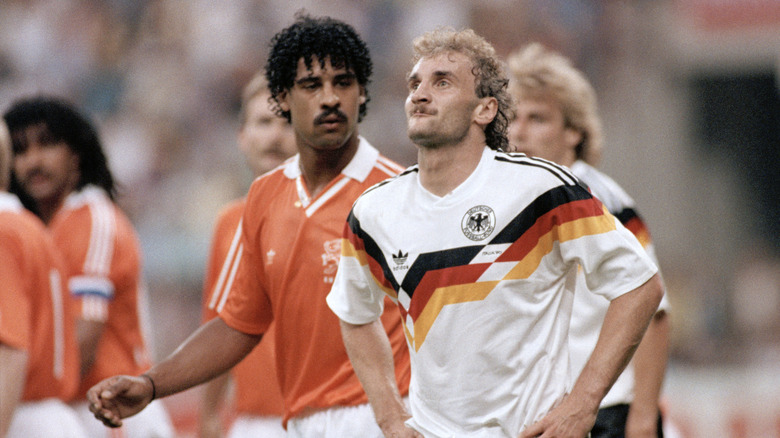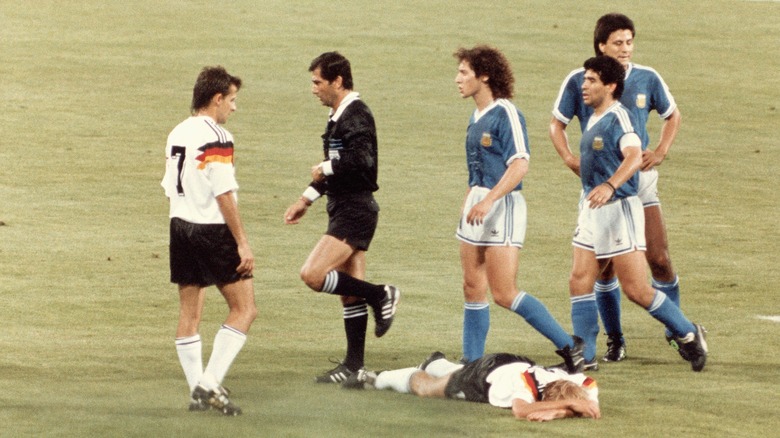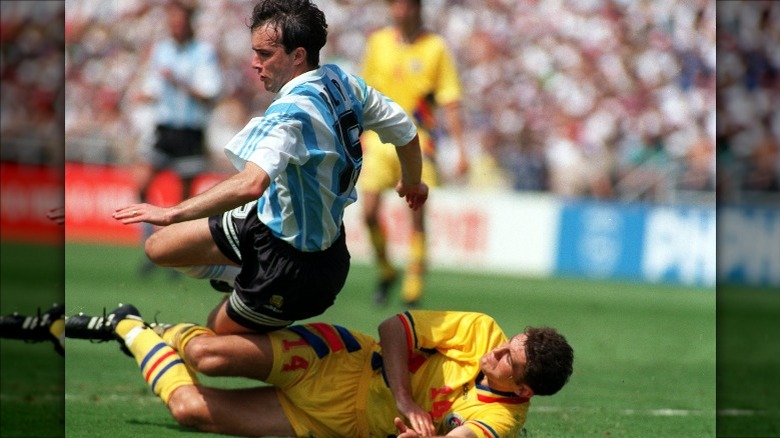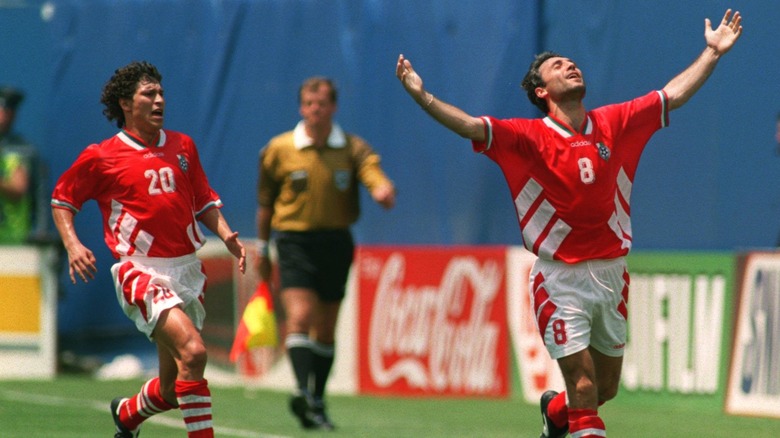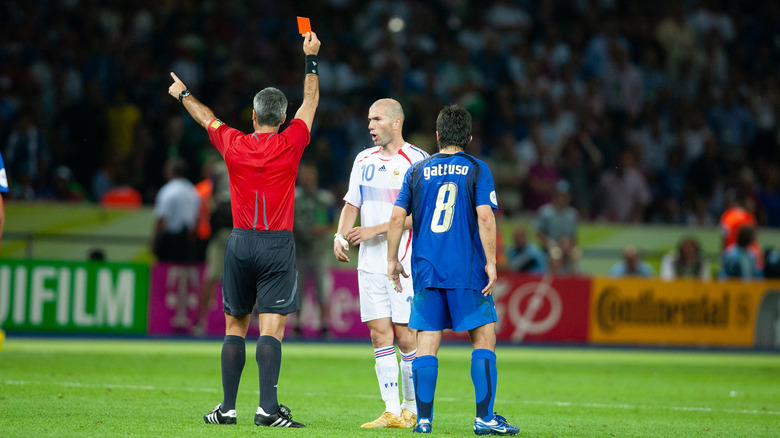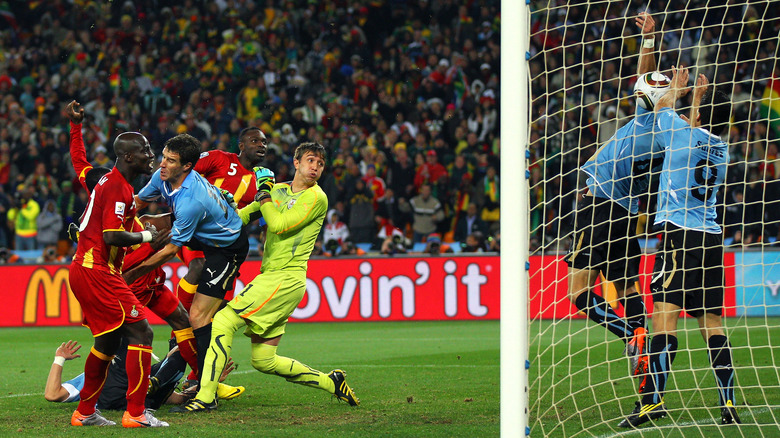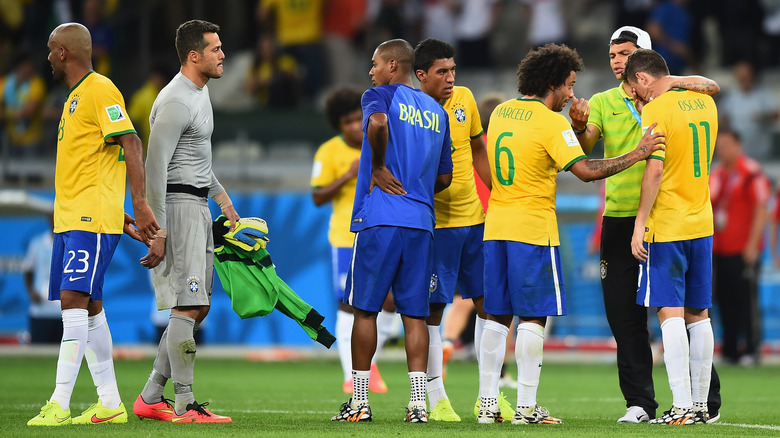The Wildest World Cup Moments In History
The FIFA World Cup is riveted with emotions and rivalries — both personal, national, and of course, political. Often, victory brings not only immense national pride but also bragging rights over rivals. Sometimes, the games are simply extensions of geo-political tensions, giving rivals and enemies opportunities to one-up each other in the sporting arena.
This volatile mix of interests and emotions has made the World Cup one of the most interesting and unpredictable tournaments, producing numerous shocks, moments of magic, and a fair share of bizarre incidents over its 90+ year history since the first tournament in 1930.
From the Italian squad's fascist ties of 1934 to Argentine Diego Maradona's personal war against the U.K. over the Falklands and more, here are some of the greatest and wildest moments of the FIFA World Cup that have made the tournament one of the biggest and most popular sporting events in the world.
Raimundo Orsi scores stunner he can't repeat later
The 1934 World Cup final pitted hosts Italy against Central European powerhouse Czechoslovakia. For Italian dictator Benito Mussolini, the final was supposed to be propaganda to solidify the triumph of fascism in sports, per the Bleacher Report. So Italy needed to win. But the Czechoslovaks nearly ruined the party — until a certain Raimundo Orsi saved the day. Despite a slew of chances, the Italians fell behind after Czech forward Antonin Puc opened the scoring in the 71st minute. Frantisek Svoboda nearly made it 2-0 in what would probably have been the end of the road for Italy.
Despite the scare, Italy did not quit. Orsi led the fightback with a stunning goal that no one seems to be able to describe how he scored. Descriptions of the goal are varied, and given the grainy black-and-white footage, it is impossible to tell how the goal actually went down. But the general narrative is that he somehow caught the Czech defense flat-footed by faking a shot with his left foot before chipping the ball over the Czech keeper with his right foot and leaving his opponent no chance to save.
The goal saved Italy and sent the game to extra time, where a goal from Angelo Schiavo gave the Azzurri their first-ever World Cup championship. The press, however, did not forget Orsi's goal even when the moment had passed. According to ESPN, reporters later asked Orsi if he could repeat the shot so they could get a good picture. He was unable to do it.
Uruguay captain confronts Brazilian fans ... in Brazil
According to Al Jazeera, Brazil hosted the 1950 World Cup after a 12-year hiatus due to World War II. In the final, the hosts were the favorites but lost 2-1 to neighbors Uruguay in a defeat that silenced the 200,000+ strong home crowd. The "Maracanazo," as Uruguay's win was called (per Hypercritic), gave rise to a number of urban legends, including the bizarre rumor that 200,000 Brazilians completed suicide over this "national tragedy."
There is, however, another more believable story. According to Hypercritic, after passing through the streets of Rio de Janeiro, filled with cries of Brazilians bemoaning their defeat, Uruguay captain Obdulio Varela and two of his teammates arrived at a bar. At the time, the players' names and faces were not emblazoned everywhere as today, so few knew what Varela (a bricklayer by trade rather than superstar) looked like — allegedly.
While the players were there, a Brazilian walked into the bar cursing Varela and accusing him of taking away Brazil's victory, not realizing the Uruguayan captain was right in front of him. So when one of Varela's companions told the man that Varela was, in fact, right in front of him, the man approached him. Now, instead of beating Varela up – as the Uruguay captain thought would happen, the guy inexplicably hugged him. At least Varela swore this is what happened to Argentine writer Osvaldo Soriano, even claiming that he sympathized with the man. "I felt bad," he said. "It would have been nice to see people having fun with something so simple." But he had "ruined it."
North Korea runs riot at England '66
Group 4 of the 1966 FIFA World Cup saw powerhouses Italy and the Soviet Union drawn with South American heavyweights Chile and minnows North Korea. As noted in the Bleacher Report, when the final round of group matches approached, Italy needed a draw against North Korea to accompany the Soviets into the second round. North Korea, having drawn with Chile, had to win.
The North Koreans held their own against Italy, holding the Azzurri to a 0-0 draw. Then, at 42 minutes, forward Pak Doo-Ik latched onto a long pass from his team's own half and slammed the ball past stunned Italian keeper Enrico Albertosi. The North Koreans held on to win, leaving their Italian opponents to return home to a barrage of trash and other refuse.
North Korea's reward was a matchup against European side Portugal and superstar Eusebio. But the North Koreans were bursting with confidence — and it showed. According to ESPN, the side ran riot, racing to a 3-0 lead by the half-hour mark. But the fairytale ended there. With Eusebio at the front, the Portuguese cut the Koreans' lead to 3-2 by halftime and eventually went on to win 5-3.
Now, one would still expect the North Koreans to have received a heroes' welcome back home. Instead, according to These Football Times, the players were sentenced to hard labor for blowing the 3-0 lead. Today, however, the 1966 squad is legendary in North Korea and among soccer fans worldwide, thanks in no small part to the documentary "The Day of Their Life."
Argentina's Antonio Rattin rags on the royals
While the Portuguese were knocking the North Koreans out of the 1966 World Cup, hosts England faced a tough matchup against South American giants Argentina, which ended in a 1-0 triumph for the hosts. But the game was marred by an incident involving Argentine captain Antonio Rattin's alleged act of disrespect towards the royal family.
In an interview with Argentine club Vermouth Deportivo, Rattin accused the referee of favoring England on every call. After the ref called him for a foul, he asked for an interpreter to get an explanation. In response, the referee told him to leave the field. According to The Guardian, the referee cited "violence of tongue" as the reason, implying that Rattin had sworn at him. Regardless of who was right, the ref's word was law. So Rattin went to Queen Elizabeth II's box and sat with his dirty cleats on the red carpet. The English fans threw chocolate at him. He then went back to the field, wringed a corner flag with the Union Jack on it as an insult to the home fans, and got showered with beer cans for that.
Today, Rattin appears to have little remorse for his actions and stands by his claim that the 1966 tournament was rigged in England's favor and the ref was in on it. But more famously, he is responsible in part for the introduction of the red/yellow card system, so that referees could eject or caution players without having to speak to them.
Henry Kissinger allegedly fixes a match
The 1978 World Cup in Argentina, per Al Jazeera, remains one of the most controversial tournaments in FIFA history. The reputation stems in part from a sordid set of allegations involving the Argentine military junta, American government officials, and the Peruvian national team. That year, the hosts reached the second round, which, unlike today, was a second group stage. According to the French statistics site Sporte-Histoire, Argentina faced Brazil, Poland, and Peru. By the time of the last game — Argentina-Peru — the hosts had to win by at least four goals to advance to the semifinal at Brazil's expense, per Telam. Argentina won 6-0.
The result was a bit surprising, to say the least, and the following allegations of a fix eventually surfaced: According to former Peru star Jose Velasquez (via RPP), six Peruvian players took bribes to throw the match, including goalkeeper Ramon Quiroga. But the fix allegedly went much, much higher, all the way to Washington, D.C. According to Peruvian Senator Genaro Ledesma (via Channel 4), this deal was the result of a political arrangement between Peru and Argentina. Peru would "disappear" political opponents to Argentina. In return, Peru would throw its game against Argentina.
Now, the veracity of Ledesma's story is unclear. But Peru captain Hector Chumpitaz claimed that before the game, Argentine dictator Jorge Videla visited the Peruvian locker room with none other than former American Secretary of State Henry Kissinger. There were no threats or anything of that sort – all the pair had to say was, "good luck." Who knows which version is true, but the whole affair was definitely sketchy.
Kuwaiti prince threatens referee into disallowing goal
The 1982 World Cup in Spain saw the tournament expanded to 24 teams, allowing greater representation from Asia and Africa, per the Spanish paper Sur. Among the beneficiaries was the small Persian Gulf country of Kuwait, which according to Arab News, was drawn into a tough group with European powerhouses England, France, and Czechoslovakia. Unfazed by their opponents' caliber, the Kuwaitis notched a well-deserved draw against Czechoslovakia thanks to a scorcher and went into their game against France brimming with confidence.
But alas, things fell apart. The Kuwaiti squad found itself down 3-1 when France scored what seemed to be a perfectly valid fourth goal. There are two different accounts of what happened. One, from Arab News, recounts that the Kuwaitis demanded the goal be disallowed for offside. But the Indian paper First Post claimed that the Kuwaiti players had stopped playing before the goal after hearing a whistle they thought came from Soviet referee Miroslav Stupar. Regardless, Kuwaiti prince and national football association head Fahad al-Sabah stormed onto the field, threatening to pull his side from the field if the referee allowed the goal to stand. Stupar caved and disallowed the goal. Not that it mattered, as France soon scored a fourth anyway to seal a 4-1 rout of the Gulf side.
Kuwait ended its first and only World Cup appearance with a 1-0 defeat to England – a respectable scoreline by all accounts. But whatever respectability the Kuwaitis had earned was lost thanks to al-Sabah's disgraceful conduct, and the team remains mostly forgotten.
Paolo Rossi slams three past Brazil – after not playing for two years
When Italy announced its squad for the 1982 World Cup in Spain, one man, in particular, stood out — Juventus forward Paolo Rossi. He was, per TalkSport, a rising star, scoring thrice for Italy at the 1978 World Cup. But his involvement in the "totonero" match-fixing scandal saw him suspended from all competitive soccer for nearly two years. By 1982, he had barely played, so few believed he would cut it at soccer's biggest event.
In the opening stages, Rossi and Italy were unimpressive. The Azzurri drew all three group matches and only made it to the second round by scoring one more goal than Cameroon. In the second round, Italy faced powerhouses Brazil and Argentina. Here, Rossi would prove his detractors wrong in style.
By the end of the second round, Italy's passage to the semifinal depended on defeating a fancied Brazilian team. The Italian media had been criticizing Rossi, calling him a "disaster." Imagine how shocked everyone was when per FIFA, Rossi opened the scoring in the fifth minute to put Italy up 1-0. But Rossi did not stop there. He scored twice more in a 3-2 thriller, netting a hat trick (three goals in one game) that few expected. The stunned Brazilians went home, while Italy marched on to the semifinal against Poland (where Rossi scored twice), and eventually a World Cup final win against West Germany. Rossi emerged as the tournament's top scorer. Not bad for a guy who hadn't played in two years.
Harald Schumacher nearly kills his opponent
The 1982 World Cup not only hosted Paolo Rossi's magic — but it also hosted a pretty egregious assault by West German goalkeeper Harald Schumacher on French defender Patrick Battiston. According to Goal.com, France and West Germany were tied 1-1 in the semifinal when Battiston, who had been substituted onto the field a mere 10 minutes earlier, had a run on goal. German goalkeeper Harald Schumacher charged out to stop him. Battiston shot and missed. But Schumacher did not stop, jumping up and knocking Battiston to the ground.
Medical staff rushed onto the field – Battiston was out cold and had no pulse, his arms flopped out to the side of the stretcher. He had lost several teeth and suffered cracked ribs and spinal damage. Per The Guardian, he needed supplemental oxygen to survive.
Incredibly, Schumacher was not even told off for the challenge (not that he seemed overly concerned). The referee missed it, while the assistant referees said it was not intentional and did not deserve a red card. Schumacher's lucky break would soon allow him to go from villain to hero. After the game finished 3-3 in extra time, it went to penalties. Schumacher saved two French penalties, sending his side to the final. The French rightfully felt robbed. Had Schumacher been sent off, Germany would probably never have made it through. For his role, Schumacher became France's most hated man – -even more than Adolf Hitler. There was some justice, though — the Italians routed Germany 3-1 in the final.
Diego Maradona hits a low and high in the same game
The quarterfinals of the 1986 World Cup in Mexico, per FIFA, pitted Argentina against England – a match that was tainted with political concerns. The same match also introduced the world to the brilliance and infamy of Argentina's Diego Armando Maradona. According to Fox Sports, the 1986 match was tainted by memories of the Falklands War (Malvinas in Spanish), which Argentina had lost to the U.K. Maradona saw the game as a continuation of the war, referring to the pitch as "my battlefield."
On the "battle"-field, Maradona opened the scoring by taking on English goalkeeper Peter Shilton for an aerial ball. But instead of using his head, Maradona punched it into the net. Neither the referee nor the other officials saw the hand, so the goal stood. Maradona had no regrets. The goal was sweet revenge, like it to "stealing from a thief" — no doubt a reference to the Falklands conflict.
Four minutes later, Maradona went from disgrace to hero with a magnificent solo goal. According to the video, Maradona received the ball in his own half, beat three English players, sprinted past at least three more, and beat Shilton with a low shot to make the game 2-0. Although England eventually pulled one back, several of their players interviewed on Sky Sports said that handball or not, Maradona had single-handedly outplayed them and destroyed their World Cup dreams.
Frank Rijkaard spits on German opponent but both are sent off
As The Guardian noted, the Netherlands and Germany have been fierce rivals. At the 1990 World Cup in Italy, the two teams faced each other in the round of 16 in a bad-tempered affair featuring one of the tournament's more bizarre red cards.
According to The Guardian, Dutchman Frank Rijkaard cut down German Rudi Voller with a brutal tackle (around the 20th minute, per the FIFA match report) and was yellow-carded. Now, Rijkaard was none too happy with the punishment, so he spat on Voller, who, for some bizarre reason, also received a yellow card once the two started arguing.
Now, ideally, the incident would have ended there, but between these two rivals, there could be no peace. Following a free kick just after the spitting incident, Voller and Dutch goalkeeper Hans van Breukelen collided over an aerial ball. So Rijkaard decided to try and pick up Voller by the ear before stamping on his foot with his cleat, which probably hurt a lot. As a result, Rijkaard was rightly sent off. Incredibly, however, according to the official match report, so was Voller – even though he had done nothing wrong. Now, according to TalkSport, Rijkaard did have his excuse for his on-field meltdown: His wife had decided to divorce him. He apologized to Voller, who accepted, and Germany eventually went on to win the whole tournament against Argentina, where there was yet more drama.
Argentina sets two firsts no one wanted
Soccer pundits, per The Guardian, generally agree that the 1990 World Cup in Italy was lacking in spectacle. This extended to the final as well. In fact, the final between Argentina and Germany ended in the latter's favor with an 85th-minute penalty, per the official match report.
The Argentine team of the 1990 final, however, is remembered quite well for all the wrong reasons. According to Sports Illustrated, there were two events in particular. The first was Argentine substitute Pedro Monzon's red card. The Argentine was sent off for tackling German Jurgen Klinsmann from behind. Now, the video shows that Monzon did foul Klinsmann, so as the LA Times noted, the red was probably deserved. But, as Sports Illustrated argued, Klinsmann's theatrics after the tackle were so over-the-top that the whole episode looked comical. According to Bleacher Report, Monzon was the first player to be sent off in a FIFA World Cup final.
Things got worse for Argentina. After Germany scored, a frustrated Gustavo Dezotti charged German Jurgen Kohler, grabbed him by the neck, and tackled him in an attempt to get the ball for a throw-in. Unsurprisingly, the referee sent him off too. So the 1990 final became known for being the only final to be settled on a single penalty and the only final to see two players sent off while also being the first final to see any player sent off at all. Pretty impressive for a game billed as lacking spectacle.
Romania knocks Argentina out at Diego Maradona's final World Cup
The 1994 World Cup, held in the United States, saw an unexpected dark horse run riot during the tournament. This was none other than the Balkan country of Romania, which had appeared in several previous editions, but never made much of an impact. According to Romania Insider, Romania arrived stateside with a young squad mostly drawn from the country's domestic league. The country faced a tough group with the United States, Switzerland, and Colombia, which the LA Times labeled as a tournament favorite. Despite a 4-1 defeat to Switzerland, two wins against the hosts and Colombia clinched Romania the top spot and a round-of-16 match against Argentina.
Now, according to The42, Argentina had problems. Diego Maradona had been banned from the tournament over a failed drug test, leaving his country without its playmaker. Meanwhile, high-flying Romania went into the game with all cylinders firing. As RI notes, the Balkan squad strangled Argentina's midfield while Ilie Dumitrescu provided firepower up front. It worked. Dumitrescu scored twice in the first 20 minutes of the game, which eventually ended 3-2 in Romania's favor.
Having eliminated the South American powerhouse, Romania advanced to another quarterfinal nail-biter against Sweden. Despite losing 1-0 for most of the game, Romania equalized two minutes from time and took the lead in extra time. Sweden equalized five minutes from time and eliminated the Romanians on penalties. When interviewed years later, several former players said they are still haunted by what could have been had they not conceded the second goal.
Bulgaria slays Germany and gets to the semifinal
Alongside Romania, Bulgaria brought pride to the Balkans with a semifinal run at USA '94, where according to the San Diego Tribune, it denied defending champions Germany a fourth consecutive World Cup final. According to HITC, Bulgaria was an unlikely semifinalist. Nigeria had trounced the Balkan country 3-0 in their opening Group D clash. But victories against Greece and 1990 runners-up Argentina gave the Bulgarians passage to the round of 16. There, a penalty-shoot-out victory against Mexico, where the Bulgarian keeper saved three Mexican penalties, set up a clash with defending champions Germany.
After falling behind to a German penalty, the Balkan side stunned Germany when Hristo Stoichkov and Iordan Letchakov scored three minutes apart from each other in the second half to make it 2-1 in Bulgaria's favor. The Bulgarians held on to win the match. It seemed like Bulgaria could go all the way – if they could get past Italy.
Alas, the dream ended with a 2-1 defeat against Italy amid allegations that the French referee missed a clear penalty that would have leveled the score to 2-2. According to HITC, Stoichkov had once said during the tournament that God was Bulgarian. The LA Times asked if He still was after Bulgaria's loss. Stoichkov's response? "The referee was French." Bulgaria had qualified for the tournament at France's expense, so Stoichkov's response implied that the referee had gotten revenge on the Bulgarians by favoring the Italians. Either way, Bulgaria ended up in fourth place, although Stoichkov won the Golden Boot as the tournament's top scorer.
The headbutt seen around the world
Zinedine Zidane is well-known as one of France's greatest players. The talisman scored two of three goals in France's 3-0 rout of Brazil in the 1998 World Cup final and led France's 2006 World Cup squad in Germany to the final against Italy. For Zidane, a World Cup win would be a fairytale ending to his illustrious career.
The 2006 World Cup final was a tale of two goalscorers. According to FIFA, Zidane put France into the lead with a penalty. But Italian defender Marco Materazzi leveled matters for Italy and the game went to extra time.
Around 12 minutes from time, referee Horacio Elizondo stopped play after Materazzi went to the ground in an off-ball, off-camera incident. Italian players protested. To everyone's shock, another camera angle revealed that Zidane had headbutted Materazzi, leaving the referee no choice but to show Zidane a straight red card. Now according to Materazzi himself (via Goal.com), Zidane told him after a dust-up in the penalty area that he (Materazzi) could have his (Zidane's) shirt after the game if he wanted it so badly. Materazzi said he preferred to have Zidane's sister.
Zidane was rightfully offended, but a better revenge might have been defeating Italy. Instead, Italy won the match on penalties to claim a fourth World Cup title, while Zidane ended his career in the worst possible way and became the topic of jokes and songs such as the famous "Coupe de boule."
Luis Suarez: Striker, goalkeeper, cheat
At the 2010 World Cup, Ghana was hoping to be the first African team to reach a World Cup semifinal, according to FIFA. Standing in Ghana's way were the Uruguayans, who, according to the BBC, were keen to reach their first semifinal since 1970. With the match at 1-1 in extra time, Ghanaian Dominic Adiyiah headed towards goal. The only thing between the ball and the goal was Luis Suarez. So Suarez decided he would rather cheat than see his team lose at the last minute and batted the ball away from the net with his hands.
Now, Suarez's offense was cynical, to say the least. But the rules, as noted in AS, called for a straight red card and a penalty – nothing more. If Ghana missed the penalty, Uruguay could win the subsequent penalty shootout after extra time — where numbers did not matter. Suarez was sent off and Asamoah Gyan, per The Guardian, stepped up to take the penalty. He missed and Uruguay won the eventual penalty shootout 4-2.
The defeat was difficult to swallow for Ghana. To add insult to injury, Suarez ran back onto the field to celebrate with his teammates, clearly displaying no regret for his handball. But as Guardian writer John Brewin noted, Suarez had mortgaged his reputation and further World Cup participation to give his team a chance of advancing. The referee applied the rules and the Ghanaians failed to take advantage of the situation. Incredibly, Suarez's gambit paid off.
Germany puts five past Brazil in 30 minutes
The 2014 World Cup was supposed to be the moment for Brazil to shine by winning the trophy in front of their fanatical fans and forever banishing the ghosts of 1950. Instead, it turned into a nightmare for the Selecao, who ended their tournament with a historic drubbing against Germany. According to FIFA, the match ended 7-1 in Germany's favor. Even more wildly, Germany scored five of those goals in the first half-hour, the hosts only managing a "consolation" goal near the very end of the match. Anyone who tuned into the game after the first 30 minutes could have been forgiven for thinking the scoreline was a mistake.
So what went wrong? According to the Bleacher Report, everything. Brazil was missing two of its best players, including defender Thiago Silva, who was suspended for two yellow cards, and forward Neymar, who was injured in the quarterfinal against Colombia.
At the end of the day, it seems that Brazil simply could not compete against the star-studded German offense. But two players do not make a team, so one cannot simply blame Brazil's loss on their absence, and as the Bleacher Report notes, Brazil's midfield failed to keep the ball away from their opponents. As the BBC noted, Brazil played so badly that the press at home awarded most of the players a 0/10 rating. And they probably deserved it, considering it ranks among Brazil's worst-ever losses, per ESPN. With that kind of result, one wonders if Neymar and Thiago Silva were happy to have missed that match.
Saudi Arabia snaps Argentina's winning streak
Saudi Arabia is not exactly considered a FIFA World Cup contender. In 2018, the side lost 5-0 to Russia. In 2006, the Saudis suffered a 4-0 defeat to Ukraine. In 2002, there was the infamous 8-0 defeat to Germany. All in all, not the best record.
At Qatar 2022, however, things shaped up a bit differently for the Saudis against big opposition. According to CNN, Saudi Arabia opened its World Cup 2022 campaign against Lionel Messi's Argentina – a tournament favorite. Now, with Saudi Arabia's last few World Cup matches, one would be forgiven for thinking the Argentines would easily smash the Saudis. After all, Messi's squad, as noted in Sporting News, Argentina was on a 36-game unbeaten streak and one away from matching Italy's undefeated record of 37 games.
Per CNN, Argentina opened the scoring with a first-half penalty – so far, no surprises. But after coach Herve Renard chewed them out in the locker room at halftime, the Saudis came out swinging. Per ESPN, Saleh al-Shehri equalized three minutes into the second half. Then Salem al-Dawsari stunned the Doha crowd and sent Saudi fans into wild celebration with a magnificent second goal to put his side 2-1. The Saudi side held on for a well-deserved victory that would be the first shock of the tournament.
